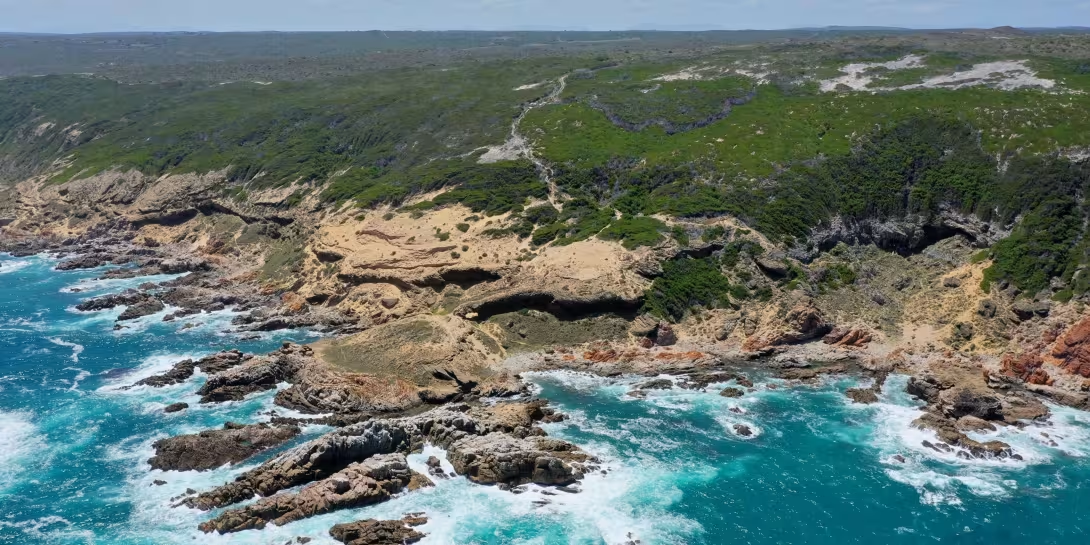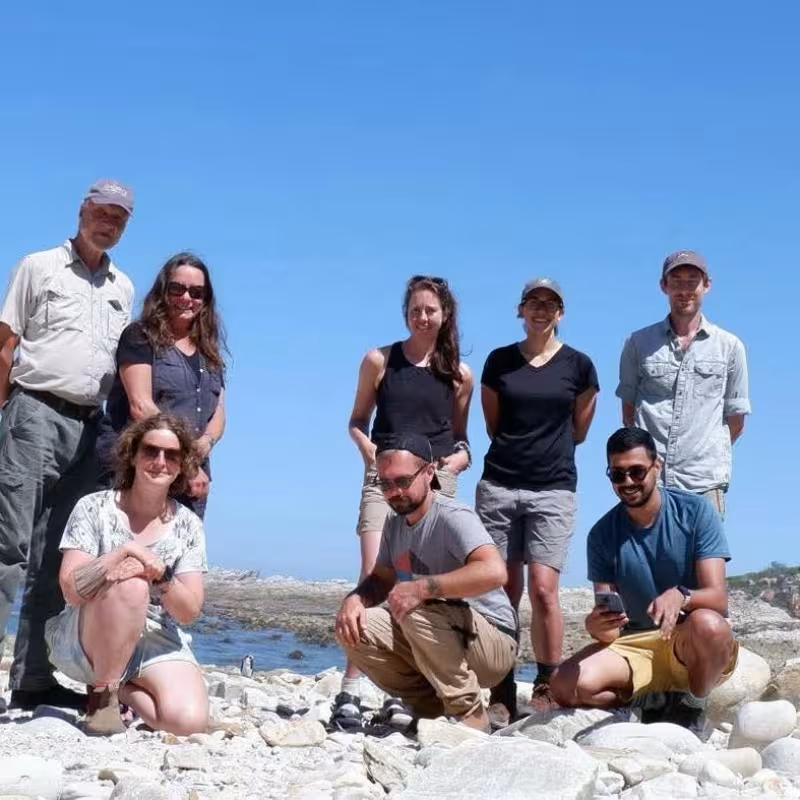Centre for Early Sapiens Behaviour (SapienCE)
The Centre aims to increase our understanding of how and when Homo sapiens evolved into who we are today.

About the research centre
Centre for Early Sapiens Behaviour (SapienCE) is a Centre of Excellence (CoE) established in 2017, funded by the Norwegian Research Council (external link).
SapienCE will consolidate UiB and Norway's position as a world leader in early human origins research. The centre is built around a team of international scientists specialized in the fields of archaeology, psychology and climatology, led by Professor Christopher Stuart Henshilwood.
The SapienCE team has exclusive access to Blombos Cave, Klasies River main site and the Klipdrift Complex; sites that contain the key for unlocking the past. The unique location of sites dated to between 120 000 and 50 000 years ago on the southern Cape coast, South Africa. A region known to be particularly sensitive to regional and global climatic forces, and therefore ideally placed for research into the marine and terrestrial environments utilized by Homo sapiens.
Time Machine – the origins of innovation
The Time Machine takes us on a journey back in time to when our ancestors lived 100 000 years ago. The film gives an insight into early human life and gives us an idea of how we may have developed into modern humans like we are today. Craig Foster has produced the film on behalf of SapienCE.
Holistic approach
Our carefully selected research teams are carrying out investigations of two new and three existing Middle Stone Age archaeological sites by looking in detail at the evidence, layer by layer, site by site. This will permit the unprecedented integration of securely-dated, high-resolution records of early human cultural, social, technological and subsistence behaviours with global, regional and site-based palaeoenvironmental information. With this holistic approach, SapienCE will provide groundbreaking insight into the diverse aspects of what it means to be human.
SapienCE Annual Reports
The SapienCE annual reports provide an insight into our main projects and activities. Here you can follow Team SapienCE in the field in the various locations in South Africa. You can read about our groundbreaking research and get an insight into how the scientists are collaborating across disciplines to bring us closer to an understanding of how and when we became modern humans like we are today. All our published reports are listed below (pdf). Please feel free to download a copy.
Worldwide collaboration
SapienCE has a complex structure with many partners and a Leader Group with PI's and senior researchers. The Leader Group reports to the Board. SapienCE also benefits from advice from the Scientific Advisory Committee (SAC). The centre is collaborating closely with the University of the Witwatersrand (external link), NORCE (external link), Royal Holloway University of London (external link), Université de Bordeaux (external link) and Universität Tübingen (external link).

People
Centre manager
Christopher Stuart Henshilwood Professor, Director of Centre for Early Sapiens Behaviour (SapienCE)
Karen Loise van Niekerk Researcher, Principal Investigator, SapienCE
Simon Armitage Center Deputy Director
Centre members
Christopher Stuart Henshilwood Professor, Director of Centre for Early Sapiens Behaviour (SapienCE)
Zarko Tankosic Administrative Manager of SapienCE
Eystein Jansen Professor in Earth Sciences /Paleoclimatology. Also affiliated with the Bjerknes Centre for Climate Research
Karen Loise van Niekerk Researcher, Principal Investigator, SapienCE
Andrea Bender Professor, Department of Psychosocial Science
Jovana Milic PhD candidate, Faculty of Humanities
Anna Nele Meckler Professor, Department of Earth Science and Bjerknes Centre for Climate Research
Eoghan P. Reeves Professor of Aqueous Geochemistry
Elizabeth Catherine Velliky Postdoctoral Fellow, archaeology
Larissa Mendoza Straffon Researcher, Department of Psychosocial Science
Jenny Maccali Researcher, Department of Earth Science
Sarah Jacoba Deborah Wurz Professor, Archaeology
Ole Fredrik Unhammer PhD candidate, archaeology
Christopher Miller Professor, archaeology
Samuel Ignatius Pereira Postdoctoral Fellow, Department of Earth Science
Zahra Haghighi PhD candidate, Faculty of Humanities
Heidi Øhrn PhD candidate, Faculty of Psychology
Asia Victoria Alsgaard Postdoctoral Fellow, SEAS Programme and SapienCE
Jasmin Oliviah Culey PhD Candidate, archaeology
Aliki Papa Postdoctoral Fellow, Department of Psychosocial Science
Kurt Heinrich Wogau Chong Postdoctoral Fellow at SapienCE and SEAS program
Marzena Cendrowska Postdoctoral Fellow, archaeology
Jeremy A. Beller Postdoctoral Fellow, archaeology
Katharina Wolff Professor, Department of Psychosocial Science
Ellie Pryor Postdoctoral Fellow, MSCA SEAS Fellow
Antoine Muller Postdoctoral Fellow, archaeology
Francesco d’Errico Director of Research at the University of Bordeaux, France, and Professor at SapienCE
Carin Andersson Research Professor, NORCE Norwegian Research Centre, Bjerknes Centre for Climate Research
Margit Hildegard Simon Researcher II at NORCE, Norwegian Research Centre, Bjerknes Centre for Climate Research
Stefan Pieter Sobolowski Research Professor at NORCE Norwegian Research Centre, Bjerknes Centre for Climate Research
Odd Helge Otterå Researcher II at NORCE Norwegian Research Centre, Bjerknes Centre for Climate Research
Professor Simon Armitage Professor in Quaternary Science at Centre for Quaternary Research, Department of Geography, Roal Holloway, University of London, UK, and at SapienCe, UiB
Zhongshi Zhang Researcher II at NORCE, Norwegian Research Centre, Bjerknes Centre for Climate Research
Ozan Mert Göktürk Senior Researcher, NORCE Norwegian Research Centre
Administrative staff
Zarko Tankosic Project Manager, Administrative Manager
Monica Pedersen Adviser, Financial Services
Anna Lisa Arefjord HR Adviser
Magnus Halsnes Adviser, Doctoral Education and Research Administration
Kirsten Moen Research Adviser
Bjørg Anja Teigland Research administrative tasks
Torunn Gjøringbø Saunes Study Adviser
Janne-Beate Buanes Duke Communication Adviser
Grethe Bruvoll Administrative tasks
Alumni
Magnus Mathisen Haaland Postdoctoral Fellow, archaeology
Katrina Nilsson-Kerr Postdoctoral Fellow, Department of Earth Science
Katerina Harvati-Papatheodorou Director Paleoanthropology, Prof. Dr. Katerina Harvati-Papatheodorou, Eberhard-Karls-Universität Tübingen Senckenberg Center for Human Evolution and Paleoe
Contact
Centre for Early Sapiens Behaviour is located at Sydnesplassen 12/13.
Postal address (letters): Universitetet i Bergen, (name of person to receive), Post box 7805, 5020 BERGEN
- Emails
- post@sapience.uib.no

